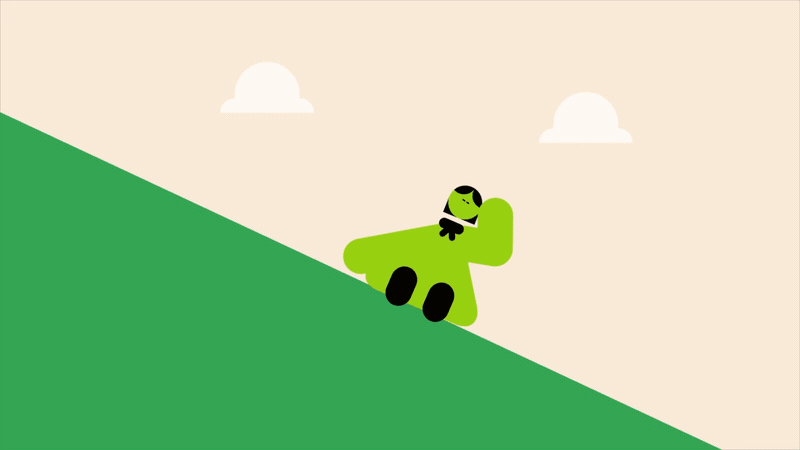
Cheesy rolling
You’ll need
- Tables
- Tape measure
- Rulers
- Chalk
- Round cheese
Before you begin
- Set up your hill—you could just use a table to make one.
- It’s up to you whether you roll one big cheese over and over again, or buy lots of little mini cheeses so everyone can roll (and eat!) their own.
Talk about cheese rolling
- Everyone should sit in a circle.
- The person leading the activity should explain that festivals and traditions happen all over the UK; they happen because of religious festivals, local traditions, and other seasonal events. Everyone should try to think of some examples of festivals and traditions that happen in the UK.
- The person leading the game should tell everyone about cheese rolling down Cooper’s Hill in Brockworth, Gloucestershire.
Roll the cheese
- Everyone should look at the hill the person leading the activity set up, and the cheese they’ve brought to roll. Everyone should predict how far the cheese will go—they could mark their guesses on the floor with chalk (or tokens).
- The person leading the activity should take the first roll.
- The next person should try to roll the cheese further. Everyone else should help count down to each roll, cheer, and encourage the person releasing the cheese.
- The person leading the game could build the drama by blowing a whistle to announce the release, or they may choose someone to be the commentator. Maybe they could even interview the winner, or the winning team.
- Once the cheese has rolled, someone should measure how far it travelled. They could write down the distance, or mark it with chalk (or a token).
- Everyone should have a turn at rolling the cheese down the hill, and everyone should cheer them on, commentate, and measure their attempt.
- Once everyone’s had a turn, the person who rolled the cheese the furthest is the winner! They could win the cheese. Depending on how big it is, they may choose to share it with everyone.
Name: Cheese rolling
Where? Cooper’s Hill, Gloucestershire
When? Spring bank holiday
Why? No one really knows how cheese rolling started. It may have had something to do with celebrating spring.
Fun facts: Competitors from all over the world chase the rolling cheese. The cheese can reach speeds of 70mph (110 km per hour)—it can be very dangerous!
Name: Bonfire Night (or Guy Fawkes Night)
Where? Across the UK
When? 5 November (but people often celebrate at the weekend)
Why? The first Bonfire Night was in 1605 when Guy Fawkes (and 12 other men) tried to blow up the Houses of Parliament. They got caught before they blew it up, and people lit bonfires to celebrate. People kept celebrating every year.
Fun facts: Bonfire night is celebrated with bonfires and fireworks. Sometimes a stuffed figure called a ‘guy’ is burned on the fire. Lewes in East Sussex is known as the Bonfire Night capital because it has the UK’s biggest celebrations.
Name: Shrove Tuesday (or Pancake Day)
Where? Across the UK
When? The Tuesday before Lent starts
Why? Christians traditionally used up all their flour, eggs, and milk before fasting for Lent.
Fun facts: There are pancake races where people run while flipping a pancake in a frying pan. A famous race is held in Olney, Buckinghamshire.
Name: Worm charming
Where? Willaston (near Nantwich in Cheshire) and Blackawton (in Devon)
When? May
Why? Worm charming started as a way of collecting worms for fishing bait but it’s now a fun competition. The worms are always safely released at the end.
Fun facts: Teams of three have a plot of around three metres by three metres. They charm the worms out of the ground using vibration, water, and music. In 2009, 10 year old Sophie Smith collected 567 worms!
Name: Burns Night
Where? Scotland (and celebrated by Scots across the world)
When? 25 January
Why? Scotland’s most famous poet, Robert Burns, was born on 25 January 1759. His work and life is celebrated on the anniversary of his birth.
Fun facts: The traditional Burns Night meal consists of haggis, mashed turnips (called ‘neeps’), and potatoes (called ‘tatties’). Haggis is similar to minced meat, but is often made from sheep’s intensives, heart, liver, and lungs.
Name: St David’s Day
Where? Wales
When? 1 March
Why? People think St David (the patron saint of Wales) died on this day, so people come together all across Wales to celebrate him.
Fun facts: Some people pin leeks to their clothes because a legend says St David gave soldiers leeks to wear before they went into battle, to show that they were one nation. If you’re at school in Wales, you might see your friends bringing in the biggest leeks they can find.
Name: St Patrick’s Day
Where? Across Northern Ireland and the Republic of Ireland
When? 17 March
Why? To celebrate St Patrick, who got rid of all of the snakes out of Ireland.
Fun facts: St Patrick’s Day is a popular celebration around the world and beyond. Two astronauts have celebrated St Patrick’s Day in space, on the International Space Station.
Name: Diwali
Where? Across the world
When? October or November (the date changes every year)
Why? Diwali is the Hindu festival of lights, Diwali. It’s celebrated in many countries across the world. In the UK, Leicester is known for making its celebrations bigger and better each year.
Fun facts: In Leicester over 6,000 lights shine along the Golden Mile. More than 35,000 people (of all faiths) watch the switching on ceremony the night before the celebrations officially begin.
Name: Chinese New Year
Where? Across the world
When? January or February
Why? Chinese New Year is the most important festival in Chinese culture. The date changes every year because the Chinese calendar is based on the phases of the Moon.
Fun facts: Liverpool has big celebrations for Chinese New Year. It’s twinned with Shanghai (the biggest city in China). Liverpool is home to one of the oldest Chinese communities in Europe, and it has the largest Chinese Arch outside of China.
Name: Up Helly Aa
Where? Shetland Isles, Scotland
When? January
Why? Around a month after the shortest day of the year, people light fires across the Shetland Isles to celebrate the traditions and heritage of this part of Scotland.
Fun facts: This is the largest Viking fire festival in Europe. People dress in Viking costumes, walk through the town carrying torches, and set fire to a traditional Viking boat.
Reflection
This activity helped remind you that you’re a local, national, and international citizen. Why are traditions important for communities? They bring people together, and they often encourage people to do kind things for one another. Can you think of an example of a tradition that encourages people to be kind?
The activity also reminded you to respect others. What other traditions do we celebrate together? People’s ideas may include Christmas, Burns Night, St David’s Day, or Ramadan. Why are traditions important? They bring people and families together, they mean important things to people, they teach us about history, and they can be fun, too. Why is it important to respect other people’s traditions, even if we don’t celebrate them? How can we respect their traditions? How would it feel if people didn’t respect things that were important to you?
Safety
All activities must be safely managed. You must complete a thorough risk assessment and take appropriate steps to reduce risk. Use the safety checklist to help you plan and risk assess your activity. Always get approval for the activity, and have suitable supervision and an InTouch process.
- Food
Remember to check for allergies, eating problems, fasting or dietary requirements and adjust the recipe as needed. Make sure you’ve suitable areas for storing and preparing food and avoid cross contamination of different foods. Take a look at our guidance on food safety and hygiene.
Build your own hills out of cardboard before you roll the cheese—why not decorate it with twigs and leaves to set the scene?
People could try and help their cheese travel further by changing the size or shape of the cheese or the angle or type of ramp. Maybe people could even aim for a specific target.
The cheese rolling attracts a big crowd. You could invite family members to watch—people could design the invitations.
Make sure you check that no one has any dietary requirements that mean you can’t use cheese. You could use dairy free cheese (cut into a circle and re-wrapped), or anything round. It doesn’t even need to be food.
All Scout activities should be inclusive and accessible.
Why not host an entire meeting of games, foods, and festivities from different places across the UK (or even the world)? You could even meet some of the other requirements of the My World Challenge Award if you take part in an act of worship, reflection, or celebration, of if you do an activity from another country.
